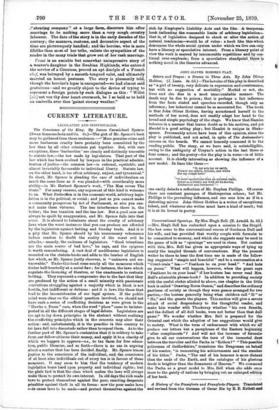CURRENT LITERAT ETRE.
LEGISLATION AND INDIVIDUALISM.
The Conscience of the King. By James Carmichael Spence. (Swan Sonnenschein and Co. Gs.)—The gist of Mr. Spence's book
may be gathered from these sentences :—" More genuine crime and more barbarous cruelty have probably been committed by the law than by all other criminals put together. But, with rare
exceptions, these 'barbarities' are clearly and distinctly traceable to statute law,—the law made by legislators. That part of the law which has been evolved by lawyers in the practical adminis. tration of justice—the common law—is rational, equitable, and almost invariably favourable to individual liberty. Statute law, on the other hand, is too often arbitrary, unjust, and tyrannical." In short, Mr. Spence is pleading the case of individualism on much the same lines as it was pleaded—with considerably more ability—in Mr. Herbert Spencer's work, "The Man versus The State." For many reasons, any argument of this kind is welcome to us. What Protection is in the economic world, arbitrary legis- lation is in the political, or social ; and just as you cannot make a community prosperous by Act of Parliament, so also you can- not make them virtuous. The less interference there is, the better; the less taxation and the less law. But a good case can always be spoilt by exaggeration, and Mr. Spence falls into that error. It is absurd to fulminate about the cruelty of arbitrary laws when the worst instances that you can produce are afforded by the legislation against betting and Sunday trade. And it is a pity that Mr. Spence should by his unnecessary vehemence induce readers to doubt the reality of the worst evil he attacks,—namely, the rashness of legislators. "Good intentions are the main source of bad laws," he says, and the epigram is worth remembering. A vast deal of meddlesome legislation is recorded on the statute-books and adds to the lumber of English law which, as Mr. Spence justly observes, is "unknown and un- knowable." Under this head come nearly all the measures which tinker half-heartedly at a social flaw ; for instance, the laws which regulate the licensing of theatres, or the enactments to restrain betting. They represent a compromise due to the fact that they .a,re produced by the action of a small minority with passionate convictions struggling against a majority which in block is not hostile, but indifferent or dubious : and it is laws like these that lead to the inconsistencies of our legal system. If the public mind were clear on the ethical question involved, we should not have such a series of conflicting decisions as were given in the "Hawke v. Dunn" case, when the word "place" came to be inter- preted in all the different stages of legal debate. Legislators are too apt to lay down principles in the abstract without realising the Conflicting principles which in the concrete may alter their action : and, unfortunately, it is the practice in this country to let laws fall into desuetude rather than to repeal them. As to the further part of Mr. Spence's contention that it is robbery to take from our fellow-citizens their money, and apply it to,a charity of which we happen to approve—i.e., to tax them for free educa- tion, public libraries, and so forth—there is no use in arguing about a matter that has been decided finally. Mr. Spence traces justice to the conscience, of the individual, and the conscience of at least nine individuals out of every ten is in favour of these measures. It may seem to him that the tendency of modern legislation bears hard upon property and individual rights ; but the plain fact is that the class which makes the laws will always make them to protect its own interest. In old days the rich made laws to protect themselves against the poor, enacting desperate phaltiea against theft in all its forms : now the poor make laws 4.-or cause laws to be made —and protect themselves against the
rich. by Employer's Liability Acts and the like. temperate book indicating the reasonable limits of arbitrary legislation.— that is, of legislation designed to check or alter the action of natural tendencies—would be of value : a book like this•which denounces the whole social ,syatem under which,we live can only have a literary or speculative interest. From a literary point of view the work is marred by innumerable repetitions and by con- tinual over-emphasis ; from a speculative standpoint there is nothing novel in the theories advanced.










































 Previous page
Previous page